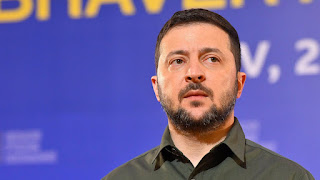Time Magazine has named Ukrainian president Volodymyr Zelensky and “the spirit of Ukraine” as its 2022 Person of the Year.
The award goes to an event or person deemed to have had the most influence on global events over the past 12 months.
Other finalists included protesters in Iran, China’s leader Xi Jinping and the US Supreme Court.
The magazine’s editor said the decision was “the most clear-cut in memory”.
“In a world that had come to be defined by its divisiveness, there was a coming together around this cause, around this country,” Edward Felsenthal wrote.
He added that the “spirit of Ukraine” referred to Ukrainians around the world, including many who “fought behind the scenes”. This includes people like Ievgen Klopotenko, a chef who provided thousands of free meals to Ukrainians and medic Yuliia Payevska who was captured, then released after three months in Russian captivity.
The magazine said Mr Zelensky had inspired Ukrainians and was recognised internationally for his courage in resisting the Russian invasion.
“Zelensky’s success as a wartime leader has relied on the fact that courage is contagious,” it said.
British trauma surgeon David Nott, who went into Ukraine to help those injured in the war, is one of several others who feature on the magazine’s cover.
Women in Iran were Time’s 2022 Heroes of the year and the K-pop band Blackpink were recognised as Time’s Entertainer of the year.
American baseballer Aaron Judge has been recognised as the Athlete of the Year and Malaysian actress Michelle Yeoh is the Icon of the Year.
Elon Musk, who was last year’s winner, was again listed as a finalist. In 2021, his electric car company, Tesla, became the most valuable carmaker in the world.
The tradition began in 1927 – although back then it was the Man of the Year.
Other past winners have included the former dictator of Germany, Adolf Hitler in 1938, and Russian President Vladimir Putin, who was 2007’s Person of the Year.
(BBC News)
The award goes to an event or person deemed to have had the most influence on global events over the past 12 months.
Other finalists included protesters in Iran, China’s leader Xi Jinping and the US Supreme Court.
The magazine’s editor said the decision was “the most clear-cut in memory”.
“In a world that had come to be defined by its divisiveness, there was a coming together around this cause, around this country,” Edward Felsenthal wrote.
He added that the “spirit of Ukraine” referred to Ukrainians around the world, including many who “fought behind the scenes”. This includes people like Ievgen Klopotenko, a chef who provided thousands of free meals to Ukrainians and medic Yuliia Payevska who was captured, then released after three months in Russian captivity.
The magazine said Mr Zelensky had inspired Ukrainians and was recognised internationally for his courage in resisting the Russian invasion.
“Zelensky’s success as a wartime leader has relied on the fact that courage is contagious,” it said.
British trauma surgeon David Nott, who went into Ukraine to help those injured in the war, is one of several others who feature on the magazine’s cover.
Women in Iran were Time’s 2022 Heroes of the year and the K-pop band Blackpink were recognised as Time’s Entertainer of the year.
American baseballer Aaron Judge has been recognised as the Athlete of the Year and Malaysian actress Michelle Yeoh is the Icon of the Year.
Elon Musk, who was last year’s winner, was again listed as a finalist. In 2021, his electric car company, Tesla, became the most valuable carmaker in the world.
The tradition began in 1927 – although back then it was the Man of the Year.
Other past winners have included the former dictator of Germany, Adolf Hitler in 1938, and Russian President Vladimir Putin, who was 2007’s Person of the Year.
(BBC News)









